- Home
- Paul Jennings
The Nest
The Nest Read online
PENGUIN BOOKS
THE NEST
In 2007, Paul Jennings’ book sales surpassed eight million copies. In 1995 he was made a member of the Order of Australia for Services to Literature and in 2001 was awarded the Dromkeen Medal for his significant contribution to the appreciation and development of children’s literature. He lives in Warrnambool, Victoria, on twenty-one hectares of coastal land which he is turning into a wildlife refuge by replacing the introduced plants with species that once made up the original native forest.
the
nest
paul jennings
PENGUIN BOOKS
PENGUIN BOOKS
Published by the Penguin Group
Penguin Group (Australia)
250 Camberwell Road, Camberwell, Victoria 3124, Australia
(a division of Pearson Australia Group Pty Ltd)
Penguin Group (USA) Inc.
375 Hudson Street, New York, New York 10014, USA
Penguin Group (Canada)
90 Eglinton Avenue East, Suite 700, Toronto, Canada ON M4P 2Y3
(a division of Pearson Penguin Canada Inc.)
Penguin Books Ltd
80 Strand, London WC2R 0RL England
Penguin Ireland
25 St Stephen’s Green, Dublin 2, Ireland
(a division of Penguin Books Ltd)
Penguin Books India Pvt Ltd
11 Community Centre, Panchsheel Park, New Delhi – 110 017, India
Penguin Group (NZ)
67 Apollo Drive, Rosedale, North Shore 0632, New Zealand
(a division of Pearson New Zealand Ltd)
Penguin Books (South Africa) (Pty) Ltd
24 Sturdee Avenue, Rosebank, Johannesburg 2196, South Africa
Penguin Books Ltd, Registered Offices: 80 Strand, London, WC2R 0RL, England
First published by Penguin Books Australia Ltd, 2009
Text copyright © Lockley Lodge, 2009
The moral right of the author has been asserted.
All rights reserved. Without limiting the rights under copyright reserved above, no part of this publication may be reproduced, stored in or introduced into a retrieval system, or transmitted, in any form or by any means (electronic, mechanical, photocopying, recording or otherwise), without the prior written permission of both the copyright owner and the above publisher of this book.
The verses on pages 40–43, 45 and 205 are from the 1817 ballad,
‘The Rime of the Ancient Mariner’, by Samuel Taylor Coleridge.
The quote on page vii is taken from Eros and Pathos: Shades of Love and Suffering,
by Aldo Carotenuto (Inner City Books, Toronto, Canada, 1989).
Every effort has been made to trace the original source of copyright material contained in this book.
The publishers would be pleased to hear from copyright holders of any errors or omissions.
penguin.com.au
ISBN: 978-1-74-228546-7
To: Julie, Jane, Penny, Deidre, Katie and Ruth; Russell, Arie, Keith, Percy, Gordon and Peter. Thank you all so much.
Who would choose innocence, even sanity, over enchantment?
Aldo Carotenuto
My father is still mesmerised by the hand. He’s terrified of its accusing silence. He suddenly takes a little backward run like a footballer lining up for a free kick and staggers over the pit. For a second he seems to be walking on air. He disappears into the hole with a scream. The swirling snowflakes follow him like tiny petals thrown into a grave. I stand a numb and frozen mourner at the edge.
A choking sound erupts. Is it from him? Or from me? I can no longer tell what’s real and what’s not and for an eternity there’s nothing. But then I hear moaning and the sound of rocks falling. I want to peer into the hole but I can’t.
I hear my father scrabbling for purchase on the frozen edge of the pit. His head emerges, glistening and wet.
‘Help me,’ he gurgles. ‘Please help me.’ He sees the icepick. ‘No,’ he screams. ‘No, no, no.’
THE NEST
1
Charlie’s on the stage trying to raise money to bring some Somali kids from Melbourne to the snowfields. The whole of Bright Dale Secondary College is here, listening. I’m sitting on the edge of the aisle in the middle of the hall so I can see her as she talks earnestly into the microphone, telling the students how she needs to raise a further six hundred dollars to give these people a holiday. It takes guts getting up on the stage like that because while most of the school appreciates what she’s saying, others think it’s a bit of a wank. I’m nuts about her.
Charlie switches on her laptop and begins a Power Point presentation. For a moment her tall frame and long dark hair are outlined on the blank screen as she hurries to the back of the stage to pick up her notes. She returns to the lectern and begins to show photo after photo of refugees in crowded camps. She flicks through the images so quickly that I hardly have time to process them. The last one is a shot of children in Africa picking up single grains of rice that have fallen off the back of a United Nations truck. Charlie leaves this image on the screen as she continues her pitch. The picture makes me anxious and I wish she’d turn it off.
Verushka and Ryan are sitting in front of me. They always hang out together and I can see why from his point of view. She’s shortish but with a great figure and knows it. She wears her hair pulled back in a ponytail with a fringe that swoops across her forehead, and her sleepy grey eyes give the impression that she’s concealing deep and mysterious secrets. When she moves she holds herself erect and glides along slowly as if she’s walking just above the ground. I’ve never known her to hurry. Sometimes I see her staring at me which makes me feel peculiar.
There’s only one word for Ryan – stylish. His bleached hair always looks as if he’s just walked out of the hairdresser’s. His ambition is to be a graphic artist in an advertising company and he’s constantly sketching expensive watches and state-of-the-art furniture draped with sexy women. He’ll probably end up buying a publicity agency and sacking anyone over twenty years old.
Charlie’s going to try and sell Give Them a Hand certificates of various values, which are just bits of paper stating how much you’re willing to donate to the cause. Most certificates are worth five or ten dollars but there’s one for sale at five hundred dollars – as if anyone would pay that.
‘Who’ll buy a certificate?’ says Charlie putting her lips close to the mike. ‘Come on; bring a refugee child to the snow for a holiday.’
There’s no response. It’s like a house auction where people are too scared to scratch their ears in case they accidentally buy the place. Finally, Jessica Green, the girls’ school captain, puts up her hand and calls out, ‘Five dollars.’
A smattering of applause follows her words.
‘Thanks, that’s a good start,’ says Charlie as she writes Jessica’s name down on her donor’s pad. ‘Someone else? These kids have gone through hell.’
Verushka is slumped down in her seat with her eyes closed. Ryan looks bored.
‘Twenty dollars,’ says a voice from the back. It’s Bazza, the Social Involvement teacher. There’s another smattering of applause. This act is generous of Bazza because the teachers have already passed the hat around in the staffroom and he’s kicked in once already.
‘Terrific,’ says Charlie. ‘Who’s next?’
‘Forty,’ calls out Mr Rogers, the school counsellor. There are a few whistles of approval – not so much because forty dollars is a lot of cash but because everyone likes him.
Another hand goes up from someone towards the front. It’s hard to see who it is because he’s got his head down in a sort of resigned, modest slump.
‘Ten bucks,’ he says. It’s James Telford, the boys’ school captain.
‘T
hanks, James,’ says Charlie. ‘Anyone else?’
A few people fidget uncomfortably in their seats. No one’s going to buy another certificate.
‘Okay,’ says Charlie. ‘Let’s show the world how generous we are.’ More silence. It goes on and on and on and Charlie starts to wriggle with discomfort.
She looks straight at me. Now it’s my turn to shift uncomfortably.
‘Robin? How about you?’
I go to speak but my mouth is dry and before I can get a word out Bazza cuts in.
‘Come on, Bright Dale. Show you care. Wake up. We need at least another five hundred dollars.’
When she hears the words ‘wake up’ Verushka opens her eyes and blinks in an exaggerated way, pretending that she’s been sound asleep. Ryan laughs. He nods at the stage and then sticks one finger in his mouth as if he wants to throw up. Verushka sniggers. I lean forward and whisper, ‘Give her a break; she’s trying to help refugees.’
Verushka turns around, stares at me and knits her eyebrows in a way that says, ‘Are you mad?’
The answer is probably ‘yes’, if what’s been happening in my head lately is anything to go by, but I don’t answer because I’m still thinking of how I can make an impression on Charlie.
‘Listen, everyone,’ she says desperately. ‘Weren’t you looking at the photos? These kids have come from countries ravaged by famine. They’d love to have what we toss in the bin every lunchtime. We’ve never known hunger. We’ve always got meat and fruit and cake.’
Poor Charlie is drowning and no one’s going to save her. She’ll never get five hundred dollars out of this lot. I feel so sorry for her. I have to do something.
‘Five hundred dollars,’ I yell impulsively.
There’s a collective gasp. Everyone turns around to see who’s so rich that they can give away that much money. Verushka turns and gives me a ‘you must be joking’ stare. Even the teachers sitting up the back are wide-eyed. Bazza stands up.
‘Are you sure about this, Robin? Maybe you should talk to your father first.’
At this point I’m totally pleased with myself. Charlie will be rapt. I am her major sponsor. I’m flushed with my own boldness.
‘No, Bazza. No worries. It’s a good cause.’
Bazza throws me a doubtful but kindly nod and sits down while Charlie writes my name in her pad. She’s blushing.
‘Thanks, Robin,’ she says. ‘It’s very generous. The rest of you are a waste of space.’ She snaps closed her notebook and slips off into the wings of the stage.
After a few hours pass my mood changes. I start to worry about what I’ve done. I can’t stop thinking about it. Why did I do it? I must be crazy.
After school Charlie comes up behind me as I shuffle with the others towards the door of the bus waiting to take us on the long trip back up the mountain. She taps me on the shoulder and beckons me to come round the back where no one can see us. ‘Come for tea Sunday night,’ is all she says. She looks directly into my eyes and lightly kisses me on the cheek. Then she’s gone.
I’m stunned. Does this mean that she likes me or was that just a thankyou for the money? The place where she kissed me is warm and heat spreads across my face and flows into my body. A kiss on the cheek from Charlie is worth five hundred bucks.
Even if I haven’t got it.
It takes two hours to get all the way to the ski slopes, and the older students who live up there usually put their bags and coats on the seat next to them so they can be alone. The juniors all fart around and make a lot of noise up the back, which is okay for them because they don’t have any homework.
The bus always starts off pretty full but as it winds through the countryside it begins to spit passengers out at little farms and settlements along the way. By the time it reaches the forest there are only ten or so left. Three of these get off at the sawmill and the rest of us stay on for the climb to the top.
I sit behind Charlie so I can look at the back of her neck. Occasionally I catch a whiff of the shampoo in her long hair, which today is in one long plait falling down over the back of the seat. My stomach is still wobbling from the little kiss she gave me. I just go into a daydream as the bus churns its way through farmland and eventually passes into the state forest. I hardly notice when we reach the first mounds of dirty snow left over from a fall a couple of weeks ago. The snow is much further down the mountain this year, which means a long season ahead, and lots of tourists. The bus climbs higher and the trees and road become blanketed in white, leaving just two muddy wheel tracks. Finally these disappear into the snow too, and there’s nothing but the roadside markers and a flat ribbon of white to lead us home.
The prospect of dinner at Charlie’s on Sunday has really stirred me up. Although I’ve been to her place I’ve never been inside or met her parents. She’s been to my house for a meal, though – if you could call it a meal. I slap the side of my face with my open hand, trying to knock the thought out of my head. Don’t think about it, don’t think about it! Too late – my high spirits dissolve like salt in water. The whole thing, which happened a couple of months ago, was a disaster from beginning to end. I wasn’t the one who invited her, my father did. Charlie’s printer had run out of toner so she’d dropped by the workshop to ask me to print out some leaflets about a rally she was organising to protest about our troops being in Iraq. Straightaway the old man started up as if he was very interested in what she had to say – probably just wanted to keep in good with her father because he’s the ranger.
‘Why don’t you come to dinner, dear?’ he said, peering at her over his glasses. ‘You can tell us more about it.’
‘Charlie’s too busy, Dad,’ I said quickly.
‘No, I’m not,’ she said. ‘That’d be nice.’
I wasn’t so sure about that but at least I’d be close to her for a whole evening.
So that night Charlie arrived at the front door holding a big bunch of gum leaves and dried bottlebrush branches. Dad made a fuss of looking for a vase that I knew we didn’t have, and after pretending it was lost he sent me out to the workshop to find an empty kero tin. When I finally found it I had to clean it up. There was a swallows’ nest on the wall and the birds had dropped mud and straw and red hairy stuff all over the tin. I was supposed to have got rid of the nest weeks ago. No time for that now. Who knows what he’d been telling her while I was gone?
After I got back and put the arrangement on the coffee table he sent me into the kitchen to bring out the food. I could hear him showing Charlie around the lounge room.
‘These are gold nuggets I found up near Jacob’s Mine,’ he said. ‘Not big, but valuable. I have a nose for gold.’ He showed her the jar with a few tiny nuggets rattling around inside. ‘And this is the head of a roo I shot ten years ago,’ he went on, pointing to the head of a poor old kangaroo which stares down from the wall. ‘I’m a good shot and won the national target-shooting trophy four years in a row.’
That was a lie because I knew for a fact that he’d bought the roo’s head in a junk shop. Charlie would know big reds live in the desert, not in snow country, and anyway it’s against the law to shoot kangaroos up here in the national park. She must have been biting her tongue because she’s not one to keep quiet over something like that.
God knows what she was making of our cluttered old lodge. The lounge has two big sofas, one with horsehair bristling out of a couple of rips in the fabric and the other with cheap foam bulging through the worn holes. Under the kangaroo’s head is a pair of crossed antique wooden skis and on another wall is a print of a Tahitian woman reclining along the branch of a tree. Next to this are a few framed cuttings from newspapers, including a photo of the former Prime Minister standing with a bunch of people in front of the chairlift company’s new resort. One blurred, grinning face in the crowd has a circle drawn around it with the word ‘me’ scrawled beside it in Dad’s handwriting.
As I came in with the food-laden tray he was pointing to the Prime Minister. ‘Now there’s
a great leader, Charlie,’ he was saying. ‘Understands the working man.’
‘What about the working woman?’ said Charlie.
‘He’s a battler,’ said Dad, ignoring her question.
All this time the TV had been blaring out with the wrestling. We sat down on the sofas in front of it and began to eat the greasy chicken that he’d sent me to buy from the take-away behind the ski-hire shop. Dad picked up a chicken leg and sucked loudly, absolutely refusing to see my ‘stop it’ looks. Charlie must have known what I was feeling because the next minute she was picking up her own chicken leg and making slurping noises too. She did it in this sort of delicate way and I knew she was just wanting to make me feel better. That is class.
Suddenly Dad started to fish around under his false teeth with his tongue. He poked the top set out of his mouth while he tried to remove a bit of food that had lodged there. The skin stretched over his cheeks so that his face looked like a hundred-year-old skull dug up from the desert.
It was the longest night of my life. I was torn between wanting to be close to Charlie and feeling sick that she’d never come near me after this. Finally she got up to go.
Outside, Charlie slowly put on her skis. ‘I’ll walk you home,’ I said.
‘There’s no need, Robin. It’s not very far.’ She turned to Dad. ‘Thank you for having me round,’ she said with that beautiful smile of hers.
I noted that she didn’t say, ‘Thank you for a lovely evening’ or ‘Thank you for the delicious meal’.
It’s Saturday, the day before I’m to go to Charlie’s for dinner. Dad’s outside trying to free the snowmobile that I forgot to take back to the Integrity Chairlift Company after he’d fixed it for them. He’s not too happy because that’s my job. The snowmobile is sheeted with ice and Dad’s pouring hot water over the tracks to try and free it. Finally the ice loosens its grip and he pushes it back inside the workshop next to his own machine, a 2006 three-seater Ski-Doo GTX which he maintains in perfect condition. He loves getting out there on the Ski-Doo with the Mountain Rescue guys who need him in case some of their equipment breaks down mid-rescue.

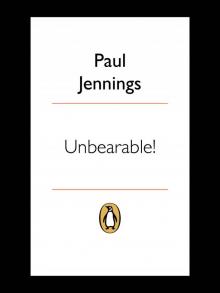 Unbearable!
Unbearable!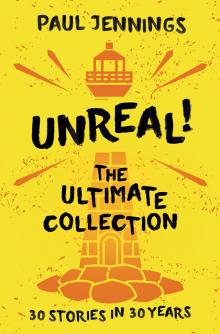 Unreal Collection!
Unreal Collection!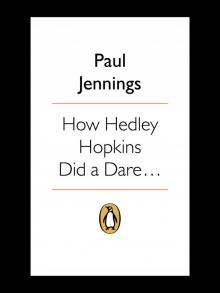 How Hedley Hopkins Did a Dare...
How Hedley Hopkins Did a Dare...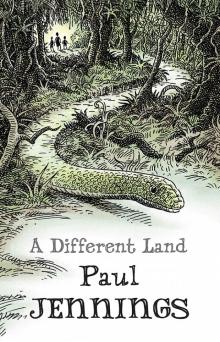 A Different Land
A Different Land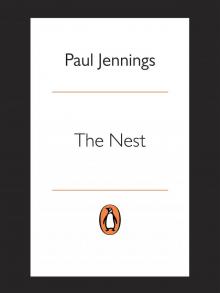 The Nest
The Nest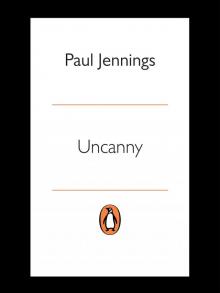 Uncanny!
Uncanny!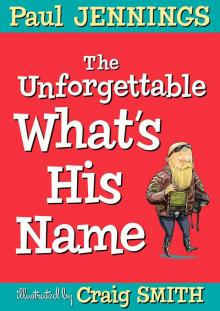 The Unforgettable What's His Name
The Unforgettable What's His Name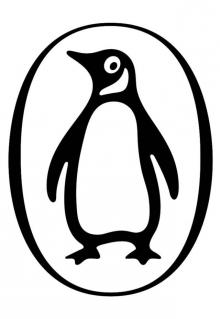 Paul Jenning's Weirdest Stories
Paul Jenning's Weirdest Stories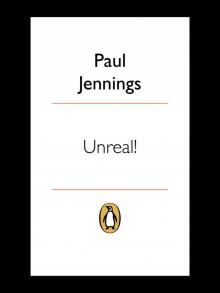 Unreal!
Unreal!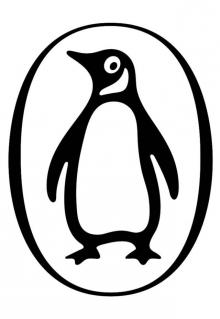 Paul Jenning's Spookiest Stories
Paul Jenning's Spookiest Stories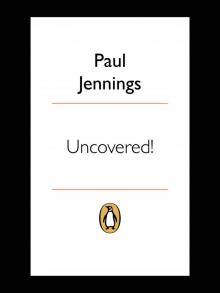 Uncovered!
Uncovered!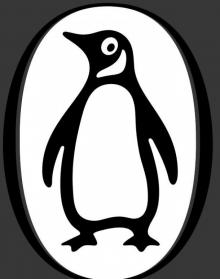 Paul Jennings' Trickiest Stories
Paul Jennings' Trickiest Stories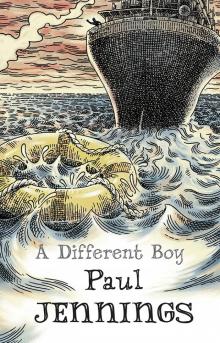 A Different Boy
A Different Boy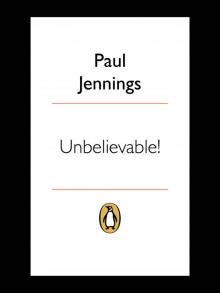 Unbelievable!
Unbelievable!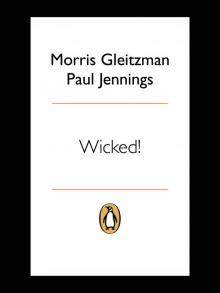 Wicked Bindup
Wicked Bindup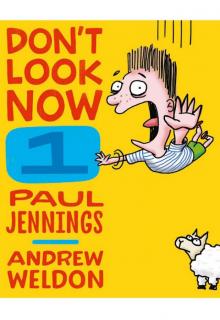 Don't Look Now 1
Don't Look Now 1